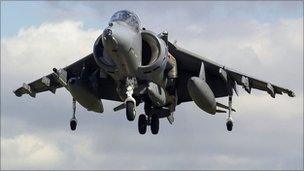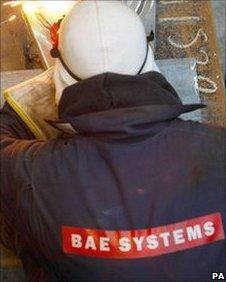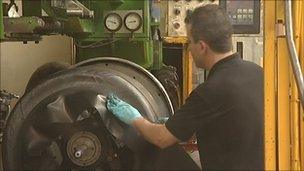BAE: Will military aviation suppliers feel the pinch?
- Published

The majority of the cuts will be made in BAE's military aircraft division
The announcement that defence giant BAE Systems will cut almost 3,000 jobs at sites across the UK will have left many staff members distraught.
But the news is also likely to cause concern among the company's many suppliers.
The majority of the cuts will be made in BAE's military aircraft division which is being affected by a slowdown in orders for the Eurofighter Typhoon fighter aircraft.
The West Midlands has a long history of involvement in the aerospace industry with many companies supplying components.
It is not the first time military aviation has faced cuts and a lot of suppliers have already diversified to supply civil aviation.
Two distinct sections
Dr John Garside, a principal fellow at Warwick Manufacturing Group at The University of Warwick, has worked in the aerospace industry throughout his career.

The firm ended days of speculation by giving details of job cuts
He said: "There are two quite distinct sections to the aerospace industry: there are military aircraft and equipment on the one side and on the other side civil aerospace which make the planes we go on holiday on.
"Most components manufacturers supply military and civil sections but in the last few years the civil side has grown quite considerably while the proportion of military business has reduced."
He said historically manufacturers in the Black Country made components for military aircraft but when orders reduced they went out and tried to win private sector contracts.
'Knock on effect'
He added: "A lot of the direct suppliers in the Birmingham area made a real significant effort to get into the civil aerospace industry 25 years ago.
"(So while the cuts) will have an impact it won't be quite so devastating."
Business leaders are also aware of the possible impact on suppliers.
John Lamb, spokesman for the Birmingham Chamber of Commerce, said: "There's bound to be a knock-on effect to suppliers. There will be a lot of people who supply BAE and there will be concerns about future work for them.
"There will certainly be people who manufacture material for them.
"If (the redundancies) are as a result of cuts in production they are probably already feeling the pinch.
"There's no question suppliers in Birmingham will be affected."
Mike Dell, president of the Black Country Chamber of Commerce, said the news was another "tragic blow" to UK engineering.

The West Midlands has a long history of involvement in the aerospace industry
He said: "It's not just the direct jobs at BAE which will be lost but it also puts at risk thousands of others further down the supply chain so the real impact will be far wider and far more damaging."
He called on the government to support the industry which was suffering after cuts to defence spending.
He said: "We would urge the government to do all it can to support British manufacturing and to ensure the skills and experience of the BAE workforce are not lost forever.
"If the government is really serious about rebalancing the economy then it needs to demonstrate how it will achieve this when we are losing our valuable skills base.
"If we don't support our defence industry now, when times are tough, then when the economy does recover and the government does want to spend more on defence then there won't be any British firms left to fulfil the orders."
- Published27 September 2011
- Published28 July 2011
- Published11 April 2011